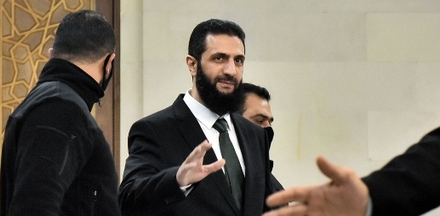France and Germany’s foreign ministers are in Damascus for talks with Syrian de facto leader Ahmed al-Sharaa, marking the highest-level Western visit since the ouster of Bashar al-Assad last month.
French Foreign Minister Jean-Noël Barrot arrived in the Syrian capital on Friday for his first visit.
“In the coming weeks, depending on how security conditions evolve, we will gradually prepare the arrangements for re-establishing the French presence here in Damascus,” he said.
Barrot is joined by his German counterpart Foreign Minister Annalena Baerbock, for talks on behalf of the European Union.
The two top diplomats are due to meet Ahmed al-Sharaa – leader of Hayat Tahrir al-Sham (HTS), the Islamist group that toppled Assad in early December.
The HTS-led interim authorities face the challenge of rebuilding state institutions while addressing international calls for an inclusive transition and safeguarding minority rights.
A fragile transition
Speaking at the French embassy in Damascus, Barrot said: “Just under a month ago, a new hope arose thanks to the mobilisation of Syrians” – describing this hope for a “sovereign, stable and peaceful Syria” as real but fragile.
Baerbock called the visit a clear signal that a “political new beginning” with Europe is possible but stressed that Syrian society must guarantee all people, regardless of ethnic or religious group, “a place in the political process” as well as rights and protection.
In a statement, Baerbock said Germany wanted to help Syria become “a safe home” for all its people and a “functioning state, with full control over its territory.”
Despite “scepticism” about HTS – which is rooted in the Syrian branch of Al-Qaeda and is designated a terrorist organisation by numerous governments – Baerbock said that “we must not miss the opportunity to support the Syrian people at this important crossroads”.
She to avoid “acts of vengeance against groups within the population,” delays to elections, and efforts to Islamise the judicial and education systems.
She also urged the new authorities to avoid “acts of vengeance against groups within the population”, to avoid a long delay before elections, and to avert attempts to Islamise the judicial and education systems.
Prison visit
The ministers plan to visit Saydnaya prison near Damascus, infamous for torture, forced disappearances and executions under Assad.
Since Assad’s removal, foreign delegations have travelled to Damascus to engage with the new leadership.
Paris sent a lower level delegation in mid-December to make initial contact with the new Syrian authorities.
Barrot began his visit by meeting Syria’s Christian leaders, who are concerned about potential marginalisation under Islamist rule. He reportedly assured them of France’s commitment to a pluralistic Syria with equal rights for all.
Syria’s civil war – which started in 2011, sparked by the Assad government’s brutal repression of democracy protests – saw Germany, France and a host of other countries shutter their diplomatic missions in Damascus.
The conflict killed more than 500,000 people, displaced millions and left Syria fragmented and ravaged.
The new authorities have called for the lifting of sanctions imposed on Syria under Assad to allow for reconstruction.
Paris is due to host an international summit on Syria later this month, following a similar meeting in December in Jordan.
Credits: rfi.fr/en

